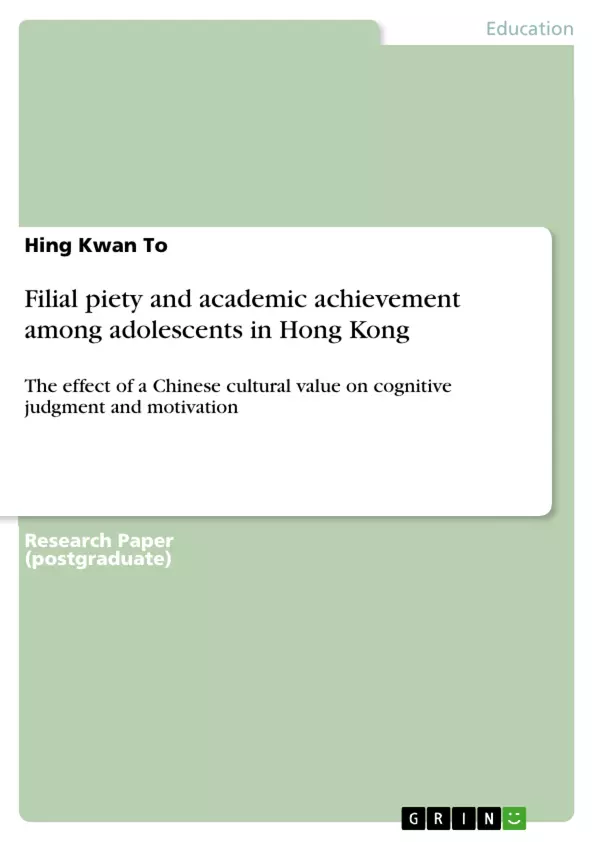Filial piety is the core value in Chinese culture. This value influences Chinese students to have high academic achievement. Unfortunately, students with low academic self-efficacy should motivate themselves to study. There were few researchers to examine the relationship between filial piety, self-efficacy and motivation.
The present research explores and examines the model of these three variables. 285 participants have been invited to finish the questionnaire. AMS-C28 motivation scale, MJSES self-efficacy scale and filial piety belief scale have been used in the study. The results show that filial piety correlates to academic self-efficacy and academic motivation directly. Also the results confirm the idea that filial piety is importance to Chinese student in learning.
Inhaltsverzeichnis (Table of Contents)
- Abstract
- Background
- The Present Study...
- Methodology
- Participants
- Measures..
- Academic Motivation Scale (AMS-C28) College Version
- Morgan-Jinks Student Efficacy Scale (MJSES)...
- Filial Piety Belief Scale..
- Procedure..
- Data Analysis.....
- Results
- Discussion
- Limitations
- Suggestions..
- Conclusion..
- References.
Zielsetzung und Themenschwerpunkte (Objectives and Key Themes)
This study aims to investigate the relationship between filial piety, academic self-efficacy, and academic motivation in Chinese students. It particularly focuses on adolescent offenders in Hong Kong, examining how these factors contribute to their academic performance.
- The impact of filial piety, a core value in Chinese culture, on academic achievement.
- The relationship between filial piety and academic self-efficacy in motivating students.
- The influence of family-oriented goals on academic motivation and self-efficacy.
- The role of academic self-efficacy in relation to academic motivation and performance.
- The implications of the findings for understanding academic motivation and performance in Chinese students.
Zusammenfassung der Kapitel (Chapter Summaries)
- Abstract: This chapter provides a brief overview of the study, highlighting the core value of filial piety in Chinese culture and its influence on student motivation and academic achievement. It outlines the research's objective to examine the relationships between filial piety, self-efficacy, and motivation.
- Background: This chapter explores the concept of filial piety in Chinese culture, its relevance to academic achievement, and the importance of examination results in Hong Kong's education system. It also discusses previous research findings on the positive correlation between filial piety and academic achievement, and the surprisingly low levels of self-efficacy observed among Chinese students.
- The Present Study...: This chapter outlines the methodology used in the study, including the participants, measures (AMS-C28, MJSES, and the Filial Piety Belief Scale), procedure, and data analysis methods. It provides a detailed description of the research design and how the data will be collected and analyzed.
Schlüsselwörter (Keywords)
This study explores the complex relationship between filial piety, academic motivation, and academic self-efficacy in a Chinese context. It examines the significance of these factors in influencing student outcomes, especially in the context of Hong Kong's examination-oriented education system.
Frequently Asked Questions
What is filial piety in Chinese culture?
Filial piety is a core value involving respect, obedience, and care for one's parents and ancestors, which significantly influences daily life and education.
How does filial piety relate to academic achievement?
In Chinese culture, students often feel a moral obligation to study hard and succeed academically to bring honor to their families and fulfill their parents' expectations.
What is academic self-efficacy?
It refers to a student's belief in their ability to successfully perform academic tasks and reach their educational goals.
What did the study in Hong Kong find?
The results confirmed that filial piety correlates directly with both academic self-efficacy and academic motivation among students in Hong Kong.
Why do some Chinese students have low self-efficacy despite high achievement?
The study explores this paradox, noting that cultural values and high examination pressure in Hong Kong can impact how students perceive their own capabilities.
What scales were used to measure these variables?
The research utilized the AMS-C28 motivation scale, the MJSES self-efficacy scale, and a specific filial piety belief scale.
- Arbeit zitieren
- Hing Kwan To (Autor:in), 2013, Filial piety and academic achievement among adolescents in Hong Kong, München, GRIN Verlag, https://www.grin.com/document/307314



